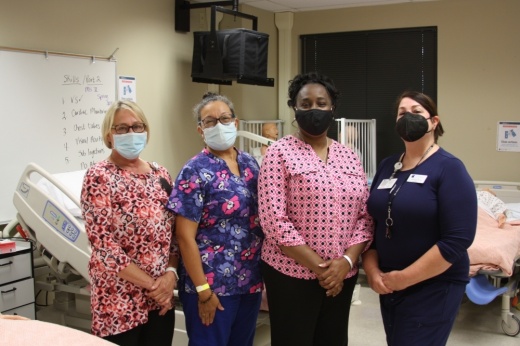In South and Central Texas, the demand for full-time registered nurses outpaced supply by 3.1% and 14.8% respectively as of August 2020. By 2032, the state health department estimates the numbers will rise to 6.7% and 19.8% respectively.
A booming population and the retirement of nurses due to burnout or age are primary factors that contribute to the need for more healthcare professionals in Texas, said Dr. Amie Bedgood, director of nursing at Texas Lutheran University.
“We are seeing a trend in which nurses are leaving the profession because they’re just burned out. They’re exhausted,” Bedgood said. “And over this last year stress levels have been probably at their max."
As the local demand for nurses continues to rise, TLU and other colleges have begun offering programming in New Braunfels to provide students an opportunity to earn a degree or certification without the need to travel.
In June 2020, TLU launched its Accelerated Bachelor of Science in Nursing program in partnership with Resolute Health Hospital.
Students are able to earn their BSN in 16 months and attend classes, labs and clinicals at the hospital.
“The whole idea [of the program] was to meet the needs of students who were wanting to come back to school,” Bedgood said. “New Braunfels, is just such a booming area, and being right off the I [I-]35 corridor was an excellent location as far as meeting the needs of students who potentially wanted to return to school to get this degree.”
Due to the coronavirus pandemic, the first cohort of students attended many classes virtually and participated in labs and clinicals in small groups.
Though the pandemic altered plans for the program, Bedgood said the changes allowed students to learn more about technology being used in the field of nursing, participate in vaccine clinics locally and have discussions about stress management.
The first class of students in the accelerated BSN program are expected to graduate this fall.
“Nursing is not meant to be online—especially your undergraduate nursing degree—and so our students have really risen to the occasion as far as really embracing that virtual world,” Bedgood said. “What better time to be at the bedside and caring for patients than in the middle of a pandemic.”
As coronavirus vaccines became available locally, nursing students played an integral role in Comal County’s coronavirus vaccination efforts by administering doses during weekly clinics.
The county hosted more than 25 mass vaccination clinics at the New Braunfels Civic and Convention Center and administered more than 25,000 doses, according to Cheryl Fraser, director of public health for Comal County.
Nursing students from two San Antonio-based colleges, Galen College of Nursing and St. Philip’s College, began partnering with the county to administer doses as part of their required clinical hours.
St. Philip’s works with Alamo Colleges District Center Texas Technology Center in New Braunfels to offer their one-year vocational nursing program where students can become Licensed Vocational Nurses.
During an April 15 Comal County Commissioners Court meeting, officials voted to approve an affiliation agreement with St. Phillip’s that will be active through April 2022 and will provide students with more clinical opportunities, Bailey said.
“If students have a local program, it can help them obtain their goals because it'd be easier on them with their family life,” said Annette Bailey, coordinator for the St. Philip’s College Vocational Nursing Program in New Braunfels. “And they can help their own community.”
The VN program gives students an affordable way to become LVNs, Bailey said, adding it is a good step toward becoming an RN. Nearly 90% of students choose to pursue their RN, often attending St. Philip’s main campus in San Antonio.
“The Texas Board of Nursing wants us to graduate safe, competent, and hopefully compassionate nurses,” Bailey said. “It is a wonderful career pathway to get your RN so you can go work in the acute care hospitals.”





